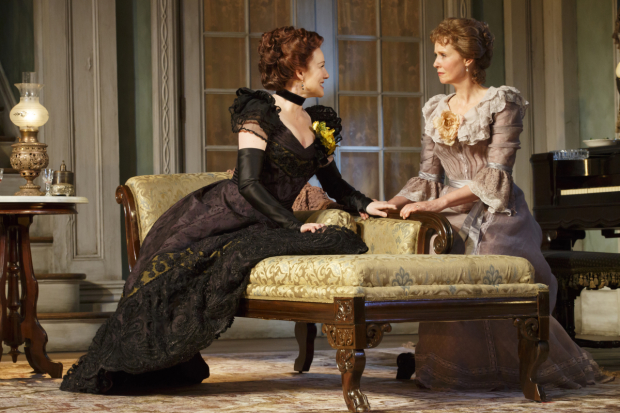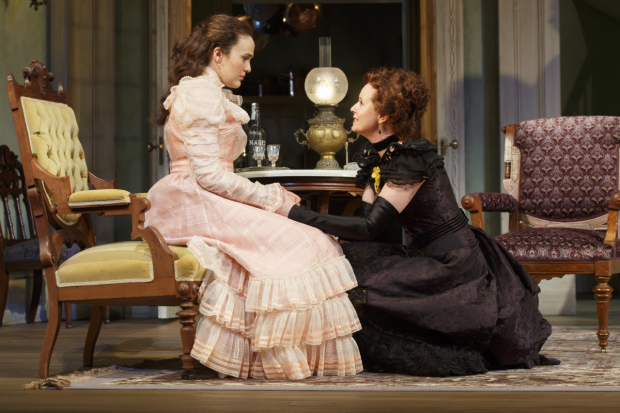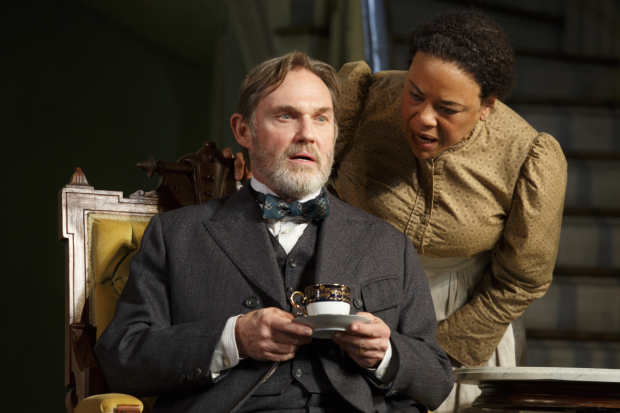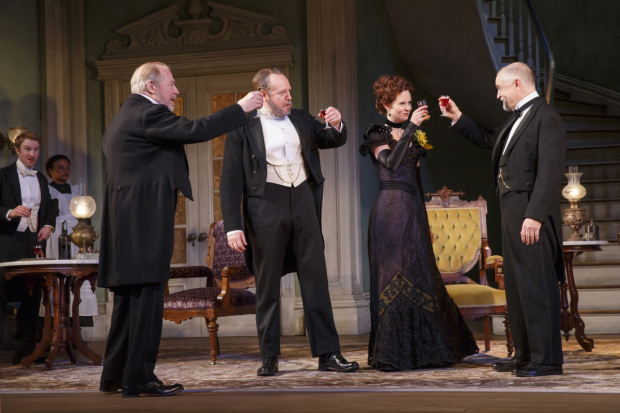The Little Foxes
Laura Linney and Cynthia Nixon switch roles every night in this revival of Lillian Hellman’s backstabbing drama.

(© Joan Marcus)
One play can tell many stories: We see that clearly in the Manhattan Theatre Club revival of Lillian Hellman's The Little Foxes, which is being performed at Broadway's Samuel J. Friedman Theatre with Cynthia Nixon and Laura Linney alternating the roles of Birdie Hubbard and Regina Giddens. The latter part is closely associated with Tallulah Bankhead (who originated the role on Broadway in 1939) and Bette Davis (who starred in the film). Under the scrupulous direction of Daniel Sullivan, Linney and Nixon prove that there is more than one way to skin a fox, with two highly contrasting interpretations that change the way we look at the play.
Of course, the basic story remains: The Hubbard siblings Ben (Michael McKean), Oscar (Darren Goldstein), and Regina (Linney/Nixon) are about to ink a deal with Chicago industrialist Mr. Marshall (David Alford) to bring a cotton mill to their small Southern town. But Regina cannot provide her share of the investment without the approval of her husband, Horace (Richard Thomas), who is convalescing in Baltimore. Regina sends her daughter, Alexandra (Francesca Carpanini), to retrieve him, seeming to care more about money than the well-being of her spouse. Meanwhile, she plots to increase her share of the profit and marry Alexandra off to her stupid cousin, Leo (a wonderfully oblivious Michael Benz), in an effort to keep the money in the family. Oscar's long-suffering wife, Birdie (Linney/Nixon), is horrified by their machinations and implores Alexandra to escape her family's ruthless capitalism.

(© Joan Marcus)
Like Lopakhin in the contemporaneous world of Anton Chekhov's The Cherry Orchard, the Hubbards come from the merchant class. The aristocratic planters of Birdie's family once looked down upon them, but times have changed: "Twenty years ago we took over their land, their cotton, and their daughter," Ben explains to Marshall in a story punctuated by Birdie slamming her hands down on the keys of the family piano. Just as Lopakhin's rise was made possible by the liberation of the serfs in imperial Russia, it is clear that the end of slavery is what prompted this reversal of fortunes in the Old South.
Even as this fact hovers in the background, The Little Foxes is guilty of romanticizing the slaveholding gentry of yore in its condemnation of the greedy bourgeoisie that has taken its place. In doing this, Hellman contributes to a long tradition in American drama that includes Harriet Beecher Stowe's Uncle Tom's Cabin (which reached its widest audience onstage) and Dion Boucicault's The Octoroon. Like Boucicault and Beecher Stowe before her, Hellman reinforces classism as a way to condemn racism: The Hubbards, we are told, have made a fortune nickel-and-diming black folks. Conversely, the altruistic Birdie implores Oscar to stop hunting so that the local black hunters won't starve. One might be led to believe that Birdie and her ilk are better stewards of the South, but at least this revival points out the absurdity of that contention.
"If we could only go back to Lionnet," an increasingly tipsy Birdie fondly recalls her ancestral estate. "Everybody'd be better there." This prompts an involuntary "mmmmm" from Addie (Caroline Stefanie Clay), the black maid. It is a grunt of dissent that is vague enough to be heard as agreement by the nostalgic and wine-drunk white people around her. Watching Clay's facial expressions throughout is a show unto itself, as she provides a running commentary with her eyes. This is one of the many little ways that Sullivan and his cast offer a subtly fresh take on The Little Foxes in what outwardly looks like a very traditional revival.

(© Joan Marcus)
Scott Pask's stately parlor set is bedecked in rich draperies, with brocade upholstery on its heavy wooden furniture. Plaster peels from the ceilings in the southern heat. Lighting designer Justin Townsend creates the authentic feel of gaslight in the first act, natural light in the second, and a rainy afternoon in the third, with water streaking down the windowpanes. Jane Greenwood's gorgeous period costumes seem to outwardly express the inner truth about the characters. Regina's gothic cocktail dress is particularly memorable, all black and purple with a yellow (or is it gold?) corsage.
This wicked-queen look goes perfectly with Linney's effortlessly icy interpretation of Regina. She's the kind of over-the-top villain whose bad behavior we secretly relish. By contrast, her Birdie is a gushing wound of a woman: She drinks wine the way she consumes oxygen, leading her to uncontrolled giggles or tears. Linney displays an impressive emotional range in her two performances.
Nixon, on the other hand, keeps everything on a narrower spectrum: Her Birdie is more fragile than any woman concocted by Tennessee Williams. All smiles and sweetness, her Regina at first seems cut from the same cloth, until we recognize her for what she really is: a poisoned peach. Even scarier, we get the sense that Nixon's Regina still believes that she is a good person wronged by the circumstances of her sex. Her strategic inertia gives her plausible deniability for her most detestable crimes: She can always count on the idiot men in her family to do her dirty work for her.
Several of the supporting players also make big impressions: Thomas brings an unexpected levity to Horace, a man who can only laugh his way to the grave at this point. Charles Turner keeps us smiling as Cal, the male housekeeper who is not nearly as tuned in to the subtext as Addie. McKean brings a comic sensibility to the role of mean older brother Ben. His electric encounters with both Reginas are worth the price of admission alone.

(© Joan Marcus)
"There are hundreds of Hubbards sitting in rooms like this throughout the country," Ben remarks to Regina, bludgeoning us with Hellman's takeaway: "All their names aren't Hubbard, but they are Hubbards and they will own this country someday." We shudder at the thought of these shopkeepers upending the social order that has always been. At least, that is what we are meant to do, but are the Hubbards really worse than the self-styled lords and ladies of Dixie? Why is inherited wealth somehow purer than wealth attained by scratching and clawing like little foxes around a vineyard in bloom? Those questions remain with us, no matter who is playing what role in this must-see revival.









